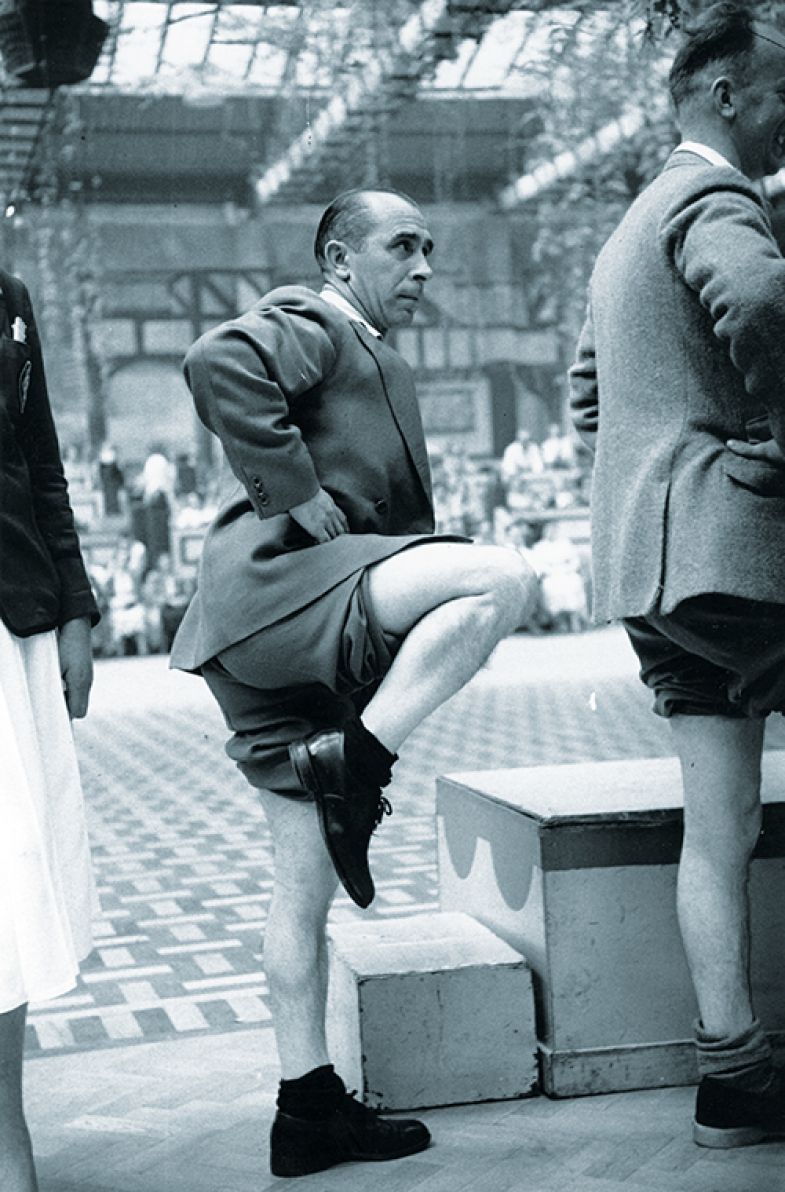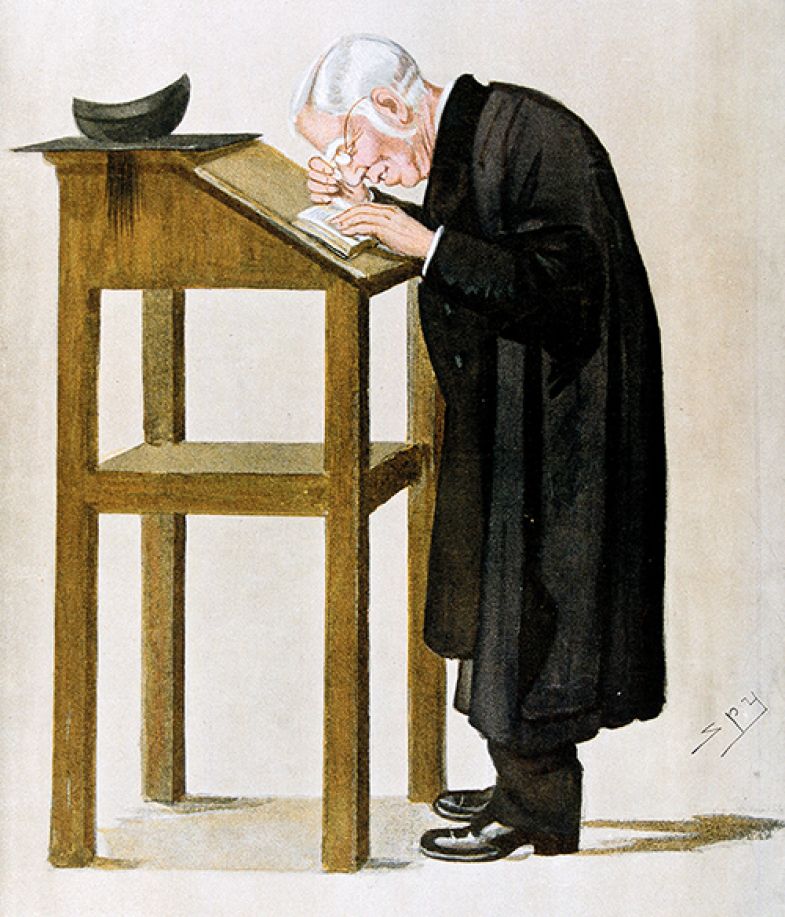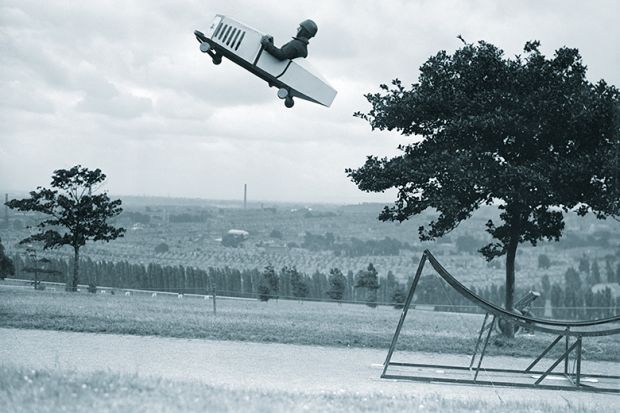Recent debates about “lecture capture” suggest a profound gulf between different conceptions of what lectures are for. Should they be bland, multimedia products maximising accessibility in all its dimensions? Or should they be, as I always intended mine to be, an opportunity to show off, provoke and perhaps offend? At the heart of this gulf is an even deeper distinction – one I see as central to academic life – between the ideals of the professional and the eccentric.
Today, most institutions operate on a simple model. If you deliver a lecture course, you want people to turn up and listen, particularly the people who are supposed to turn up. When your performance is evaluated at the end, you want them to say nice things, stressing that you delivered on aims and met the needs of those to whom you should be delivering. That sounds normal, professional, even inevitable. Yet I remember, and look back to, a time when things were very different.
As a final-year undergraduate, I attended the lectures of the legendary philosopher A.J. (“Freddy”) Ayer on the possibility of language without predicates. Given that lectures in Oxford in those days were only loosely attached to courses and that all members of the university could attend, they were hanging off the rafters during the first lecture: more than three hundred of them. By mid-term, there were only six of us. It was complex and abstract material and there was no compromising with the stupid. Freddy also indulged in a rather odd habit of pointing at the board as if he had written something on it when actually he hadn’t.
Later, on forming a friendly conversational acquaintance with him, I discovered that he thoroughly enjoyed baffling people and took pleasure in watching his audience diminish to a hard core. He was Wykeham professor of logic and the author of a book that had sold a million copies, Language, Truth and Logic (1936) – although he now declared it to be “entirely wrong”. He had no need for audience satisfaction. Today, his behaviour would no doubt count as a prime example of academic eccentricity.
Only two years later, I was teaching in the politics department of a new university where one of my senior colleagues seemed inordinately fond of the word “profession”. He used it in rather menacing ways such as “If you are going to advance within the profession” and “I think that would find general disfavour within the profession”. I felt threatened by this. I had entered the academic world precisely because I didn’t fancy any of the professions, with their dress codes and fixed working hours. (Many years later, I would write a book in defence of amateurism.) I wasn’t even sure what “the profession” referred to. Was it the whole of academic employment? Or was it just our specific subject?

Some subjects look a great deal more like professions than others. A test might be whether one could credibly intervene in an everyday situation because you are a professional. If someone faints, “Excuse me, I’m a doctor” is fine, provided you are a medical doctor. In a pub argument about Brexit, “Excuse me, I have a doctorate in politics” isn’t going to work. To put this more formally, the “profession” lacked most of the institutional conditions of a profession. It didn’t have particular qualifications. (Fifty years ago, many of those teaching rapidly expanding subjects such as politics and sociology in new universities didn’t have doctorates or even degrees in those disciplines but in various combinations of history, law and philosophy.) Nor was there a formal entry into the profession or an organisation that defined it.
It is clear looking back that I was not even slightly attracted to the idea of academic life as a subclass of the “professional”, but because it had space for the eccentric. There were legends of eccentricity that we repeated endlessly, dropping jaws and giggling about things that could only happen in universities. The Scottish professor who hid in the cupboard at the front of the lecture hall and waited until people were beginning to assume he wasn’t coming before bursting out. (I can’t remember what that proved.) The law professor who staged an aggressive entry by a supposedly cuckolded lecturer shouting at and threatening him and who then got everyone to write down what they had seen and heard, thereby demonstrating that witness statements aren’t worth much. My friend’s ancient history tutor, who raised his plus-fours in the middle of a class and asked what adjectives could be used to describe his knees. My history tutor, who carried on developing a bizarre range of photographs while I read him my essay on the failures of fascism and communism in inter-war Britain (“Don’t worry! I’m listening”). My colleague whose introductory lecture on 19th-century political thought consisted of accounts of the wedding nights of four great thinkers.
Most academic eccentrics were, of course, men because most academics were then men and perhaps many women felt the need to prove themselves in more conventional ways. But there were magnificent exceptions, not least the great philosopher Elizabeth Anscombe, with her cigars and monocle and seven children. Her range of opinions seemed an almost random mixture of the extreme left and extreme right until you listened to her talking about them and they seemed entirely coherent.
One subcategory of eccentric who obviously wouldn’t get away with it now was the hellraiser academic. By this I mean those who were some combination of drunk, very rude and violent. I could name friends of mine in more than one university who had racked up a list of female students they were going to sleep with and male ones they were going to have a fight with on graduation day.
It may be difficult for contemporary academics to believe how much alcohol used to be consumed. One of the best classes I ever taught was an all-female group who came to me immediately after a lecture by a distinguished philosopher. “How was X today?” I once asked jovially. Heads dropped. After I suggested he might have been drunk, there were silent nods and one quietly volunteered: “He gave the same lecture as last week.” It wouldn’t have occurred either to me or to them to report the incident. That, of course, is eccentricity at its worst – and something I’m pretty sure I avoided for my entire career.
One of the great embodiments of academic eccentricity was Professor Furie, as played by Timothy West in the 1980s BBC television series A Very Peculiar Practice. Furie is brilliant, aggressive, paranoid and tangential; since this was the dawn of research assessment, he was also looking for drugs that would enable him to work harder. I recognised in him characteristics of at least four people wandering round the Warwick campus. Since I had played football with the author, Andrew Davies, I asked him whether I was right. He politely and sensibly refused to tell me.

But who is the original exemplar and perhaps patron saint of eccentricity? One obvious candidate would be the Reverend William Spooner (1844-1930), who not only invented the eponymous linguistic trick (“You have hissed all my mystery lectures…”) but was given to substituting names, such as referring to St Paul as “Aristotle”. Another might be Joseph Bell, who taught Arthur Conan Doyle and inspired the creation of Sherlock Holmes.
Even considering those names suggests that the relationship between professionalism and eccentricity is very complex. The two might seem to be in tension, but they can also be not just compatible but complementary. Holmes (and so Bell) has spawned myriad descendants in medicine and policing. Popular culture never offers us the by-the-book ultra-normal figure as hero, but always the maverick, the instinctive, the brilliant person who breaks the rules and does things differently. It is eccentricity that is seen as effective. The Reverend Spooner was claimed by many to be the most effective warden New College ever had. And their eccentricities in no way detracted from the vast achievements of Anscombe and Ayer.
This leaves us with two final questions about eccentricity, one very small and one very large. The very small one, possibly of interest only to me, concerns how eccentric I myself was. I think the answer was that I was increasingly classifiable as eccentric because of my innate conservatism and technophobia. I never changed the size of my seminar groups. I refused to advance beyond “chalk and talk” in my lectures. I berated colleagues for emailing me when they were three doors away and could have spoken to me. I did not have “office hours” but said I was available whenever I could be found. My door was usually left open for that reason, rather than from any fear of accusation.
Just occasionally my performance may have become a bit wacky. I was once ranting at a large group of first-years and working up considerable steam against certain trends in contemporary ideas to which I was hostile. Rightly or wrongly, I had the impression that the audience was “in the palm of my hand” and, to demonstrate my fervour, kicked over the lectern as if it were the body of ideas which I so disliked. This incident was a “one-off” and in other respects I was the perfect professional: in all the decades I never failed to turn up at the time and place I was supposed to turn up.
The bigger question is about the state and future of eccentricity. It is still the case that in popular culture, such as the television series Morse and its successor Endeavour, academics are often presented as eccentric – and sometimes as egomaniacs with a marked interest in the occult. But there are many reasons why reality does not live up (or down) to this image. One of them, I would argue, is the expansion and democratisation of universities. If you are a self-confident person at what you perceive to be a “top” university, then you might appreciate some wacky old geezer who calls St Paul Aristotle. But if you are in debt and wondering whether higher education is really for you, then you might welcome a more straightforward approach. (My own teaching experiences since retirement have suggested that my ways of doing things are more appreciated in the more prestigious institutions.)
Expansion, bureaucracy, “political correctness” all conspire to exclude the eccentric. But I still think there is an absolute need to leave space for it. In traditional colleges and departments there was often a kind of symbiotic diversity. Some people were very good at being reliable and professional and detailed, others at being memorable or entertaining or inspiring. They often complemented each other very well. A career structure in which you have to tick all the boxes to be promoted – or even to survive – seems considerably less efficient in using talent than that which used to exist.
So, in an age that claims to value diversity, perhaps we should introduce a new (or very old) set of ranks to encourage diversity of role. Let’s get away from the tedious academy full of professors afraid of doing anything eccentric or even striking because they know their lectures are being captured and might be held against them. Instead, let us go forward (and back) to a medieval complexity of rank and revive the wranglers, the exhibitioners and the praelectors – and perhaps even the jesters.
Lincoln Allison is emeritus professor of politics at the University of Warwick.
POSTSCRIPT:
Print headline: A walk on the wild side
Register to continue
Why register?
- Registration is free and only takes a moment
- Once registered, you can read 3 articles a month
- Sign up for our newsletter
Subscribe
Or subscribe for unlimited access to:
- Unlimited access to news, views, insights & reviews
- Digital editions
- Digital access to THE’s university and college rankings analysis
Already registered or a current subscriber? Login







